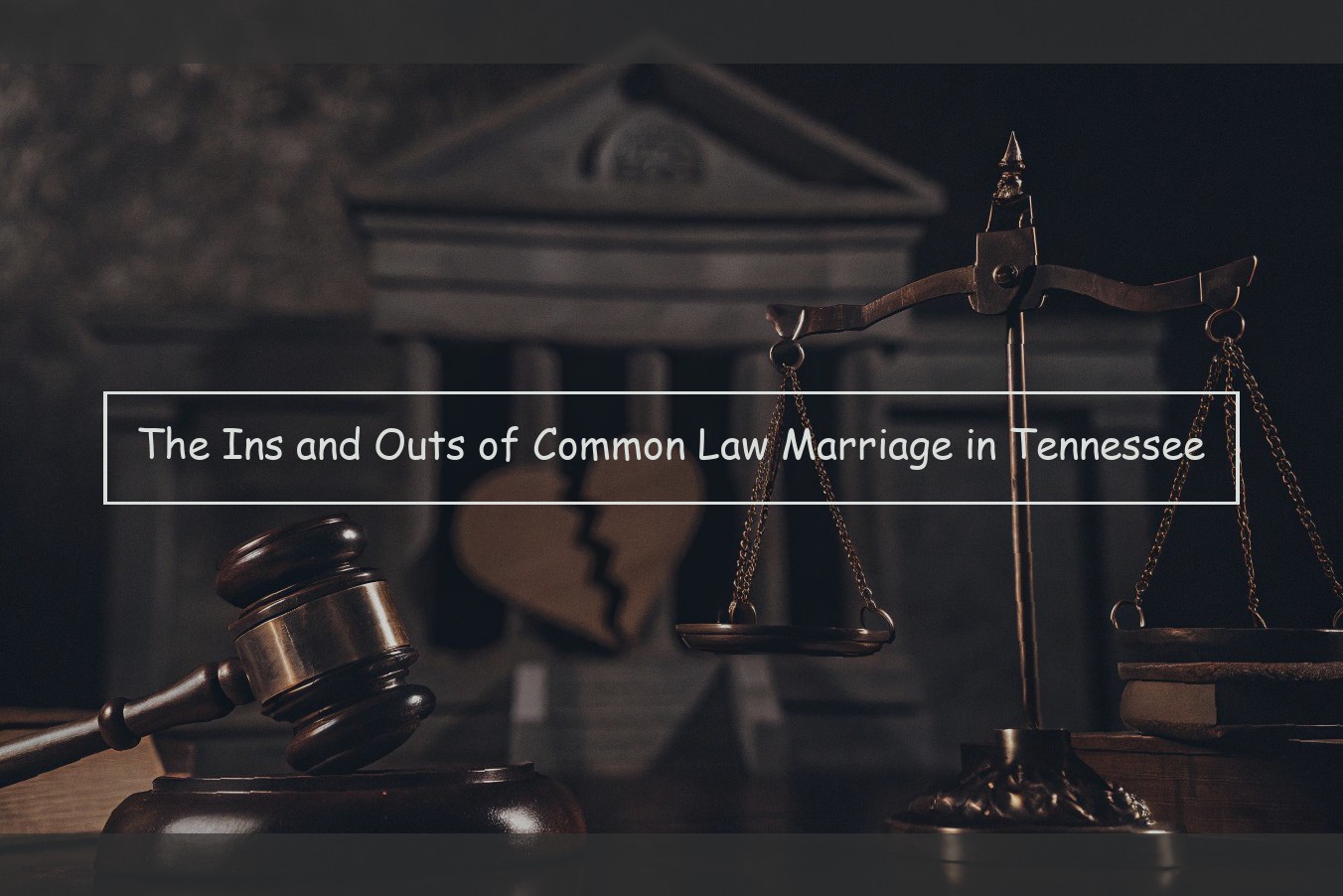A Definition and Brief Overview of Common Law Marriage
Common law marriage refers to a type of marriage that may exist in a minority of jurisdictions despite the lack of license as typically required for formal marriages. In Tennessee, common law marriage may be recognized if it was validly entered into prior to 1/1/2016. The celebration of a common law marriage in a jurisdiction that does not recognize it will typically not be honored by the State of Tennessee.
In states that accept common law marriage, six elements must usually be met:
• The couple must agree to marry .
• The couple must consent to their status as husband and wife.
• The couple must cohabitate to establish a threshold period of time together, which varies from state to state.
• Both parties must have legal capacity to enter into a formal marriage, including being of sound mind and being of the legal age to marry.
• The couple must possess common repute and public personus.
• The couple must hold themselves out as married.

Tennessee’s Position on Common Law Marriage
Common law marriages do exist in many states, but Tennessee does not recognize them. In fact, the state of Tennessee has actually legislated against this practice. In 1817, state lawmakers passed a law which went into effect in 1822 that clearly abolished the practice of common law marriage in Tennessee. Since then, all state residents, regardless of status or sexual orientation, must follow the marriage laws and not pursue a common law marriage for their union to be considered legal.
Additionally, Tennessee laws changed in 1931 and 1933 to further solidify the ban on common law marriages. By 1955, the state passed a law stating that any common law marriages entered into after 1 January 1955 are void and cannot be legally recognized. Furthermore, Medical and Life Insurance policies will not recognize common law marriages entered into after this date.
The simplest explanation for why Tennessee has gone out of its way to prevent the recognition of common law marriage is the legislation defining marriage very clearly and directly in The Tennessee Code Annotated § 36-3-501 for those who wish to become legally wed.
Alternatives to Common Law Marriage in Tennessee
The simple fact is that in Tennessee, there is no formal recognition of any alternative forms of nontraditional relationships such as domestic partnerships or civil unions. While many states have adopted domestic partnership and civil union laws, Tennessee has not.
In lieu of a domestic partnership or civil union, couples may be able to enter into a cohabitation agreement. A cohabitation agreement is a legally enforceable contract recognizing the relationship between two adults who are living together as a couple. Cohabitation agreements are used to regulate the relationship by identifying the rights and responsibilities of each individual and/or distribute property and allocate debt in a certain way upon a specific event identified in the agreement, such as death or separation. Cohabitation agreements may also be a means to modify the terms of any existing legal agreement that is otherwise void in Tennessee. For example, an agreement entered into for the purpose of a domestic partnership or civil union would not be financially enforceable in Tennessee, but if modified to something like a cohabitation agreement with terms not specific to the domestic partnership or civil union, the modified agreement may be enforceable.
Whilst cohabitation agreements can be a useful alternative to the common law marriage concept, the concept itself is not legally recognized or afforded any special benefits or protections by Tennessee state law, and in a legal sense, living together as a married couple is not necessarily any different than living together as a non-married couple. The court will consider cohabitation in making decisions such as spousal support, but it may not always consider living together to constitute sufficient justification for the dissolution or modification of an agreement between two individuals. For example, in forma pauperis divorce actions under Tenn. Code Ann. §36-4-101(a), the spouses are required to submit an affidavit that set forth the financial status. Spouses who have been living separately for six months or more are required to disclose all assets and liabilities, regardless of whether acquired by one or both of the spouses during the period of cohabitation. Since there is no domestic partnership or civil union concept in Tennessee, the court may even require that spouses who have been separated for six months or longer disclose all assets and liabilities, regardless of acquisition.
As such, individuals in such non-traditional relationships should enter into cohabitation agreements with their partners to protect themselves legally and afford some measure of similar benefits that have been recognized by the state for traditional marriages.
Common Law Marriage without Rights
For couples who choose to set up household together but do not want to marry in Tennessee (or who are not able to marry according to state law), there are ways to legally protect their rights and to delineate the responsibilities of the relationship. Such steps include:
Property It is possible for individuals who live together with a spouse or significant other as a family unit to enter a tenancy in common agreement with each other, or with a child or children from one or both parties. This can help to designate ownership of primary or secondary residences, furniture and any other property owned by one of the parties in order to prevent the other from claiming ownership or an interest in it should the relationship break up or a party decides to marry someone else.
Bank Accounts and Personal Property In addition to delineating other property interests, Tennessee residents who choose to live together rather than marry often keep their finances separate, with individual checking and savings accounts for personal use. It is possible, however , to designate others as joint owners or to require multiple signatures to withdraw money or exercise other financial rights with joint accounts. Some couples also enter into a formal prenuptial agreement that includes various clauses for the dissolution of the assets in the marriage in order to protect individual rights.
Child Custody Unmarried parents must go through the courts to establish paternity for minor children before they can gain the full custody rights enjoyed by married parents, who are considered married under the law. A Tennessee family law attorney can help individuals petition for paternity.
Alimony Although alimony is typically paid after divorce, Tennessee residents do have some rights under the common law to support from either their spouse or significant other in the event of separation or dissolution of the relationship. For example, the law will not allow an employer to fire an employee because they are married to a company owner if the company would allow the same employee to remain employed had they been single. Similar criteria apply to dissolution.
Domestic Violence Under the law, unmarried couples have may have the same rights as married couples when it comes to domestic violence allegations. This allows them access to some of the same protections enjoyed by married couples who call for help when they face situations of abuse or violence.
Dispelling Common Myths of Common Law Marriage in Tennessee
Many people still have misconceptions about common law marriage in Tennessee. The purpose of this section is to clearly state what these misconceptions are and to help you understand the truth.
One common misconception about common law marriage is that a couple need only cohabitate for a certain period of time to possess a common law marriage. This is not true. The law does not provide a specific time frame for which a couple must live together. In fact, there is no specific length of time. If the court determines that a common law marriage existed, then it will be considered as such.
Another misconception is that all common law marriages must be proven by certificate or some other written documentation. This misunderstanding is based on the long-held belief that common law marriages can only be proven by a common law marriage certificate. This is not entirely true. It is possible to prove a common law marriage without a written certification.
Another common misconception is that a common law marriage automatically exists in every state. This is false. While many states recognize common law marriages, it is not the case that all states do. You should check with the law of your specific state to determine its position.
Myth also exists regarding the dissolution of common law marriages. Some people believe that a divorce is not necessary to end such marriages. However, when two common law spouses wish to end their relationship, a divorce is not only necessary but is the only means of terminating a common law marriage.
Taking the First Step Towards Legality in Tennessee
In Tennessee, there are two important requirements for parties to become legally married: a marriage license and a place of worship or forum at which the parties will exchange consent.
With respect to the first requirement, Tennessee issues marriage licenses to parties who have identified themselves as such, and who submit to any checks for their legal eligibility to marry. Tennessee addresses eligibility to marry in T.C.A. § 36-3-104, which provides in pertinent part: (a) No person shall be eligible to enter into a marriage contract until the person has attained the age of eighteen (18) years…(c) No marriage between a person over eighteen (18) years of age and a person under eighteen (18) years of age shall be valid unless a court of competent jurisdiction has authorized such a marriage. Tenn. Pub. Acts 1943, ch. 22, § 2; 1952 Pr. Acts, ch. 646, § 1; 1978 Pub. Acts, ch. 800, § 5.
Tennessee requires acceptance of its citizens’ personal responsibility to conform to its laws, in exchange for the privileges of residing in Tennessee. In order to serve as a Tennessee residence for purposes of obtaining a marriage license, both parties must verify their street addresses, and if they are not residents of the county where the marriage license is sought, must verify their current address, as well as an address for the past previous twelve months. This form of verification is usually by representatives of the department of motor vehicles and/or the voter registration office. In order to prevent misrepresentation as to one’s identity, Tennessee requires that all parties desiring to marry verify their true legal names and any alternate names used, including providing documentary evidence of any name changes by court order or by dissolution of marriage.
A party may be exempt from the legal age requirement or from having their street address in the county where the marriage license is sought , but the party who is shall present the written rebuttable presumption that such exemption exists. T.C.A. § 36-3-104(b). Regardless of whether they are required to furnish this presumption, parties must appear before the municipal or county official who is authorized to issue marriage licenses, and must bring with them to the office: (1) Personal ID (driver’s license, photo identification card, military ID, passport, or birth certificate); (2) Marriage License Application and required documents as set out above); and (3) Payment of the fee that is charged by the municipality or county for issuing marriage licenses. T.C.A. § 36-3-106.
Assuming the parties have provided the documents and other information required as a prerequisite to issuance of the license, then the presiding official "shall issue the license on the day of the application and shall record the license in the marriage records of the county [or metropolitan] clerk." T.C.A. § 36-3-106(a), (f).
The next step in formalizing the relationship of the two people who are seeking marriage involves the exchange of their vows that they are "free to marry, and that [they] choose…to marry." T.C.A. § 36-3-108(a). The marriage vows are a component of the "ceremony of marriage." T.C.A. § 36-3-101. In essence, the ceremony can be held "in a church, temple, court, office or other public forum, so that it will be a "public procession before an audience of committed friends and associates." Kraft v. Kraft, 320 S.W. 2d 192 (Tenn. App. 2013, citing Lee R. Lawrie, Architecture of the Cathedral Church of St. John, New York City).
That a ceremony of marriage is not required does not change the fact that it constitutes a formal acknowledgment of the legal relationship entered into the marriage license the parties obtained, and must be filed with the governmental official who issued the marriage license.



